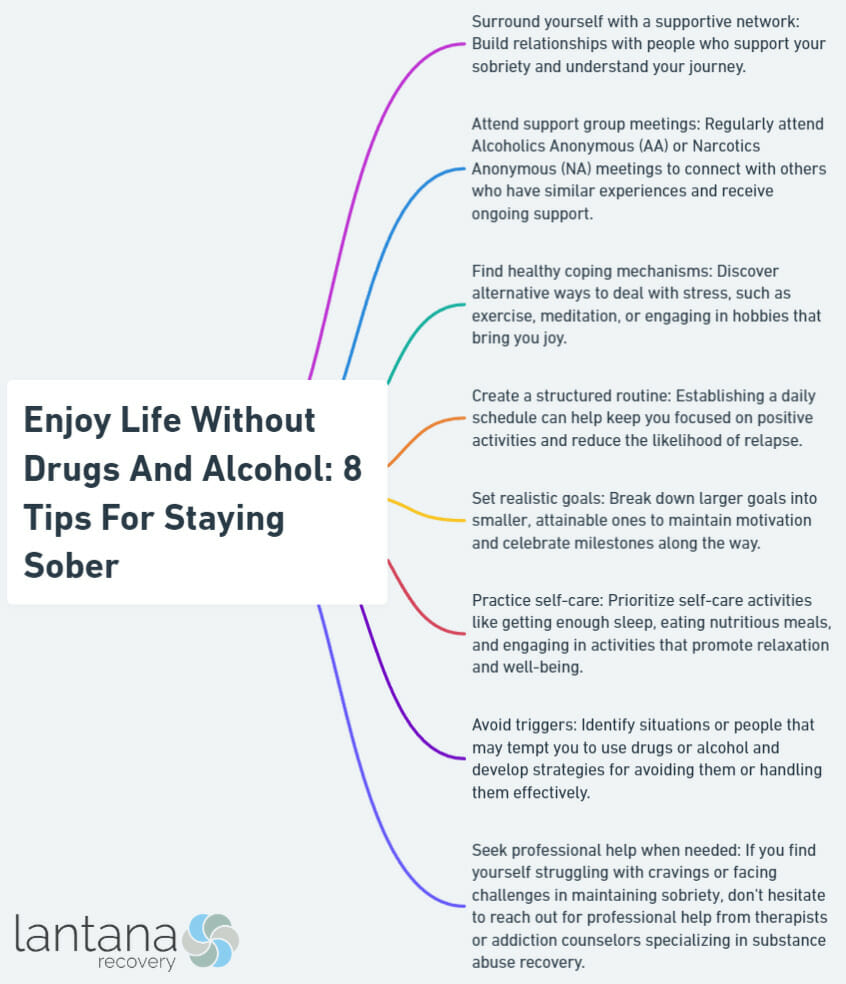Imagine a life free from the shackles of addiction, filled with joy, improved health, stronger relationships, and a newfound sense of purpose. Yes, it’s possible to enjoy life without drugs and alcohol, and we’re here to show you how. In this blog post, we’ll explore the negative impacts of addiction, discuss strategies for embracing a sober lifestyle, and share inspiring success stories of individuals who have built fulfilling lives in sobriety. Let’s embark on this life-changing journey together!
Short Summary
- Discover the joys of living a drug-free life with improved physical and mental health, strengthened relationships, and greater happiness.
- Foster healthy habits through seeking professional help for addiction treatment and engaging in sober activities like cooking or gardening.
- Find motivation to stay sober by exploring success stories that inspire us to build supportive networks, prioritize self care & pursue personal growth.
Understanding the Impact of Drugs and Alcohol

“Substance abuse negatively impacts public safety, reduces workers’ productivity, and contributes to higher healthcare costs, premature deaths, and disability for millions of Americans.”
Drugs and alcohol can have serious consequences for:
- Physical health
- Mental health
- Relationships
- Overall quality of life
Especially in cases of drug or alcohol addiction. Giving up drugs and alcohol can be a challenge for someone with addiction because of denial, fear, or the desire for joy in everyday life.
Moreover, the influence of drugs and alcohol on society extends far beyond individual experiences, shaping communities, health systems, and economies. “Substance abuse negatively impacts public safety, reduces workers’ productivity, and contributes to higher healthcare costs, premature deaths, and disability for millions of Americans.” (The Disease of Addiction: Origins, Treatment, and Recovery, Angres, Bettinardi, 2008)
Being able to enjoy oneself in recovery is essential to leading a healthy life. It can help to:
- reduce stress
- build relationships
- find purpose
- rewire the brain’s reward circuit
Physical Consequences
Drug and alcohol abuse can have serious consequences, such as:
- Damage to vital organs like the brain, heart, and liver
- Physical and psychological dependence
- Liver damage
- Heart problems
- Weakened immune system
These are all potential consequences of abusing drugs and alcohol abuse.
Alcohol abuse can cause serious damage to the liver, heart, and immune system, reported Jürgen Rehm and Colleagues in their study, The relation between different dimensions of alcohol consumption and burden of disease: an overview from the journal Addiction.
Are these consequences worth the temporary high?
Mental Health Challenges
Drug and alcohol addiction can heighten existing mental health issues or even bring on new ones, such as depression and anxiety. Dopamine, a powerful neurotransmitter that plays a key role in emotion regulation, is significantly impacted by drugs and can contribute to mental illness.
Focusing on mental health and addressing any trauma can help you feel amazing without relying on substances and can also improve brain function by positively affecting the brain’s reward circuit.
Music, for example, can reduce stress levels, enhance sleep quality, and strengthen relationships, which can be especially helpful as the brain begins to heal from addiction. Accepting one’s feelings can be an empowering experience that can help manage symptoms. In some cases, family therapy can also be beneficial in addressing addiction-related issues.
Relationship Struggles
Drugs and alcohol can cause various negative effects on relationships, including:
- Emotional instability
- Mistrust
- Communication difficulties
- Abusive tendencies
- Difficulty establishing intimate connections
Moreover, drug and alcohol abuse can trigger erratic behavior, mood swings, and aggression, making it challenging to maintain stable and positive interactions. This compromised emotional state can prevent the addict to foster healthy attachment, suggests a research understanding the impact of substance use disorders on families and children by Laura Lander in Journal of Social Work in Public Health.
Overcoming these challenges is essential to beat addiction and lead a more fulfilling life. Making amends is an important part of the process to repair relationships. By addressing these issues and rebuilding connections, you create a strong foundation for a life free from addiction.
Embracing a Sober Lifestyle

Choosing to say no to drugs is the first step towards a more rewarding life of joy. Shifting one’s mindset is essential as it allows for a fresh start of a journey that can be full of fun, as well as excellent physical and mental health.
Maintaining sobriety while attending parties is an achievable goal! Avoiding environments where alcohol and drugs are being used and attending therapy to learn healthy coping mechanisms during stressful times can set you up for success.
Having a supportive friend who supports your recovery completely can make all the difference. They won’t leave you to fend for yourself and can be there to talk when cravings hit.
Building a Support Network
A support network is a wonderful group of people who provide emotional and practical assistance to someone in need. It can include friends, family, and peers who offer encouragement, encouragement, and opportunities for personal growth. Having a strong support network is a key factor in preserving mental health and wellbeing.
Introduce yourself to new people at meetings or other sober gatherings, grab a bite to eat or some coffee, and attending functions such as picnics or dances are all great ways to meet new people in recovery. Constructing new relationships in recovery can give you a sense of belonging and a support network of people who can relate to your experience.
Prioritizing Self-Care
Self-care is an important practice to achieve, maintain, or promote optimal health and well-being. Examples of self-care activities include:
- Exercising regularly
- Eating healthy foods
- Fostering and maintaining healthy relationships
- Getting good-quality sleep
- Seeking professional help when needed
- Following treatment plans for current ailments or diseases
Getting regular exercise, forming meaningful relationships, and exploring your interests can all be beneficial for your wellbeing. To maintain healthy habits, follow these steps:
- Set achievable goals.
- Break them down into smaller tasks.
- Track your progress.
- Reward yourself for successes. Additionally, having a support system of friends and family to motivate and encourage you can make a huge difference in staying on track.
Pursuing Personal Growth
Developing new skills, hobbies, and interests can be a rewarding experience that can help to expand one’s knowledge and abilities. Examples of activities that can help with personal growth include:
- taking classes
- learning a new language
- volunteering
- joining a club or organization
- exploring new hobbies
All of these activities can be incredibly stimulating and enjoyable.
By engaging in activities that promote skill-building, hobbies, and interests, you can help to bolster self-esteem and gain a sense of accomplishment. This can be especially helpful for individuals in recovery, as it can offer them a new sense of achievement to replace the one they may have associated with substance use.
Overcoming Challenges in Sobriety

Some common opportunities of sobriety include:
- Successfully completing rehab and re-entering society
- Learning to manage stress in healthy ways
- Developing new coping strategies to deal with withdrawal symptoms and cravings
- Improving mental health
- Managing anxiety and sleep disorders
- Strengthening relationships with family members
To stay strong when you find yourself alone and tempted by drugs and alcohol, reach out and call someone to keep you company. It can be a great way to stay on the right path.
Managing Cravings
Cravings are powerful urges for something, often related to food or substances like drugs and alcohol. They can be caused by a range of physical or mental factors, such as:
- hormonal imbalances
- suboptimal diet
- high stress
- lack of sleep
Cravings can also be developed behaviors associated with an event or environment.
Mindfulness practices, distraction, and positive self-talk are all great tools to help you stay in control and manage cravings. Especially, practicing mindfulness has many good effects on our minds. It can make us feel happier, reduce stress, and control emotional reactions points Keng et al. in their study Effects of Mindfulness on Psychological Health: A Review of Empirical Studies from Clinical Psychology Review, 2011. Seeking support from others can be incredibly beneficial in managing cravings, as it can provide a helpful distraction, emotional support, and accountability.
Handling Social Situations
Drug and alcohol use can be more prevalent in social situations like parties, bars, clubs, concerts, and other events where people come together to socialize and have a good time. Additionally, the presence of others using these substances can increase the likelihood of drug use.
To ensure your safety and comfort when attending social events, it’s important to:
- Set boundaries for yourself
- Have an exit plan in case you feel uncomfortable
- Have a designated driver
- Avoid certain people or activities
- Have a plan for how to leave the event if needed
By following these steps, you can enjoy social events while also prioritizing your well-being.
Additionally, having a support system in place is also important. This could include:
- Having a friend or family member who can help you if needed
- Having someone to call if you need a ride home
- Having someone to talk to if you’re feeling overwhelmed
Dealing with Relapse
Relapse can be an important reminder of the importance of maintaining abstinence from drugs or alcohol and continuing to practice healthy behaviors. It can also serve as a reminder of how quickly a former state or practice can return if we do not remain diligent. Relapse can lead to serious consequences, such as physical and mental health issues, financial problems, and strained relationships.
It is important to be aware of these risks and take steps to prevent them. Taking time to reflect on what led to the relapse and identifying any triggers that may have contributed can be immensely beneficial. Additionally, seeking support from family, friends, and professionals from an outpatient drug treatment center can be a great way to stay motivated and on track.
The Benefits of a Drug-Free Life

Living a drug-free life can bring about remarkable physical health, strong connections with family and friends, and an overall sense of joy and contentment. Physical exercise can be incredibly beneficial for mental wellness, as it releases endorphins that ignite the brain’s pleasure center, resulting in improved mental wellness.
You can achieve natural dopamine highs through proven methods. Physical activity in the fresh air can greatly increase the benefits of exercise.
Enhanced Physical Health
Living a drug-free life can bring about improved physical health, such as a lower risk of infections, a healthier body, and increased job productivity – all great reasons to stay drug-free. Enhanced overall health and well-being are among the many advantages of abstaining from drugs and alcohol.
As your physical health improves, so does your ability to fully embrace the joys of sobriety. Exercise is one of the most effective and healthy social activities that don’t require drinking as well as help with cravings.
Strengthened Relationships
Living a drug-free life can help foster improved communication, trust, and overall relationships with family and friends, as well as lead to increased self-esteem. Focus on honing your communication skills, being truthful and transparent with your beloved ones, and establishing healthy boundaries.
By addressing these issues and rebuilding connections, you create a strong foundation for a life free from addiction.
Greater Happiness and Life Satisfaction
Life satisfaction is an essential part of well-being, physical health, and social relationships. It is determined by various factors such as:
- Relationships
- Career
- Health
- Personal values
Enhancing any of these can help you improve your overall evaluation of your life and your sense of contentment.
To skyrocket your life satisfaction, focus on building meaningful relationships, pursuing meaningful work, taking care of your physical and mental health, and living according to your values.
Seeking Professional Help

Professional addiction treatment can be a powerful tool in helping you overcome substance use disorder and stay sober. It provides therapy, support groups, and medication-assisted treatment to help you on your journey. The various types of professional addiction treatment available include medical detox, cognitive behavioral therapy (CBT), 12-step support groups, and complimentary therapies – all of which are designed to help you overcome your addiction and lead a healthier life.
The incredible benefits of professional addiction treatment include:
- Flushing the substance from an individual’s system with the support of around-the-clock care from medical experts
- Providing a safe, judgment-free space to foster a sense of joy and acceptance of oneself and one’s past
- Helping individuals build new, healthy habits for a brighter future
Sober Activities for Fun and Connection

Finding sobriety-friendly activities to enjoy is a great way to have a good time! Look for activities that bring you closer to other sober people, help you exercise, or just make you happy. Some examples of sobriety-friendly activities include:
- Cooking
- Photography
- Gardening
- Reading
- Knitting
Engaging in these activities can bring joy and help you stay away from relapse.
Volunteering can bring a boost of happiness and increase your overall life satisfaction. Consider throwing a sober party! You can have full control over what happens at your party and create a fun, supportive environment for everyone.
Here are our ideas on things to do instead of drinking at party while you are trying to quit alcohol.
Success Stories: Inspiring Examples of Life Without Drugs and Alcohol

We can share examples of inspiring stories of life without drugs and alcohol that demonstrate how individuals have overcome addiction and built fulfilling lives in sobriety. These stories can provide hope and motivation to others on their journey.
Inspiring recommendations and learnings from success stories of life without drugs and alcohol include the importance of building a supportive network, prioritizing self-care, and pursuing personal growth for a brighter future.

Summary
In conclusion, enjoying life without drugs and alcohol is not only possible, but can lead to a more fulfilling, healthier, and happier existence. By understanding the impact of addiction, embracing a sober lifestyle, overcoming challenges, and seeking professional help, you can build a solid foundation for a life free from addiction. Let the inspiring success stories and sober activities serve as motivation and encouragement on your journey towards a brighter, drug-free future.
Frequently Asked Questions
How can I reward myself without drugs?
Reward yourself with a “Success Savings” by putting money away for each sober day and recovery meeting attended. At the end of the year, use the money to treat yourself to a mini-vacation as a reward for all your hard work!
Creating a “Success Savings” is a great way to reward yourself for your hard work in recovery. Put money away for each sober day and recovery meeting attended. At the end of the year, the year ends.
What are 10 ways to say no to drugs?
Say no firmly and confidently, back it up with clear reasons, find a positive distraction, show you care about yourself and your friends, take control of your body, get creative in saying no, make sure your words match your body language, know your excuses ahead of time, be honest and straightforward, plan ahead and practice ways to turn down drugs, and stay away from risky situations.
Making the decision to say no to drugs is an important one. It can be difficult to stand up to peer pressure, but it is important to remember that you have the power to make your own decisions. Knowing how to say no in a confident and assertive way can help you stay safe and make the right choices.
How did Russell Brand recover?
Through dedication and determination, Russell Brand was able to use Alcoholics Anonymous to overcome his addictions and move forward with his life. He has found freedom from the bonds of drugs and alcohol and is now focused on a brighter future.
Brand has become an advocate for recovery, using his platform to spread awareness and help others who are struggling with addiction. He has become a role model for those who are looking to make a change in their lives and find happiness.
What is a reason to avoid using alcohol?
Excessive alcohol use can lead to the development of serious problems such as high blood pressure, heart disease, stroke, liver disease, and digestive problems.
Additionally, it increases the risk of communicable diseases, traumatic death and injury (e.g., through car crashes), and congenital anomalies.
What are the benefits of living a drug-free life?
Choosing a drug-free lifestyle can bring long-term physical health benefits, enhance meaningful relationships and create a sense of happiness and satisfaction.
The physical health benefits of a drug-free lifestyle include improved cardiovascular health, better sleep, and a stronger immune system. Additionally, abstaining from drugs can help to reduce the risk of developing certain chronic illnesses.









